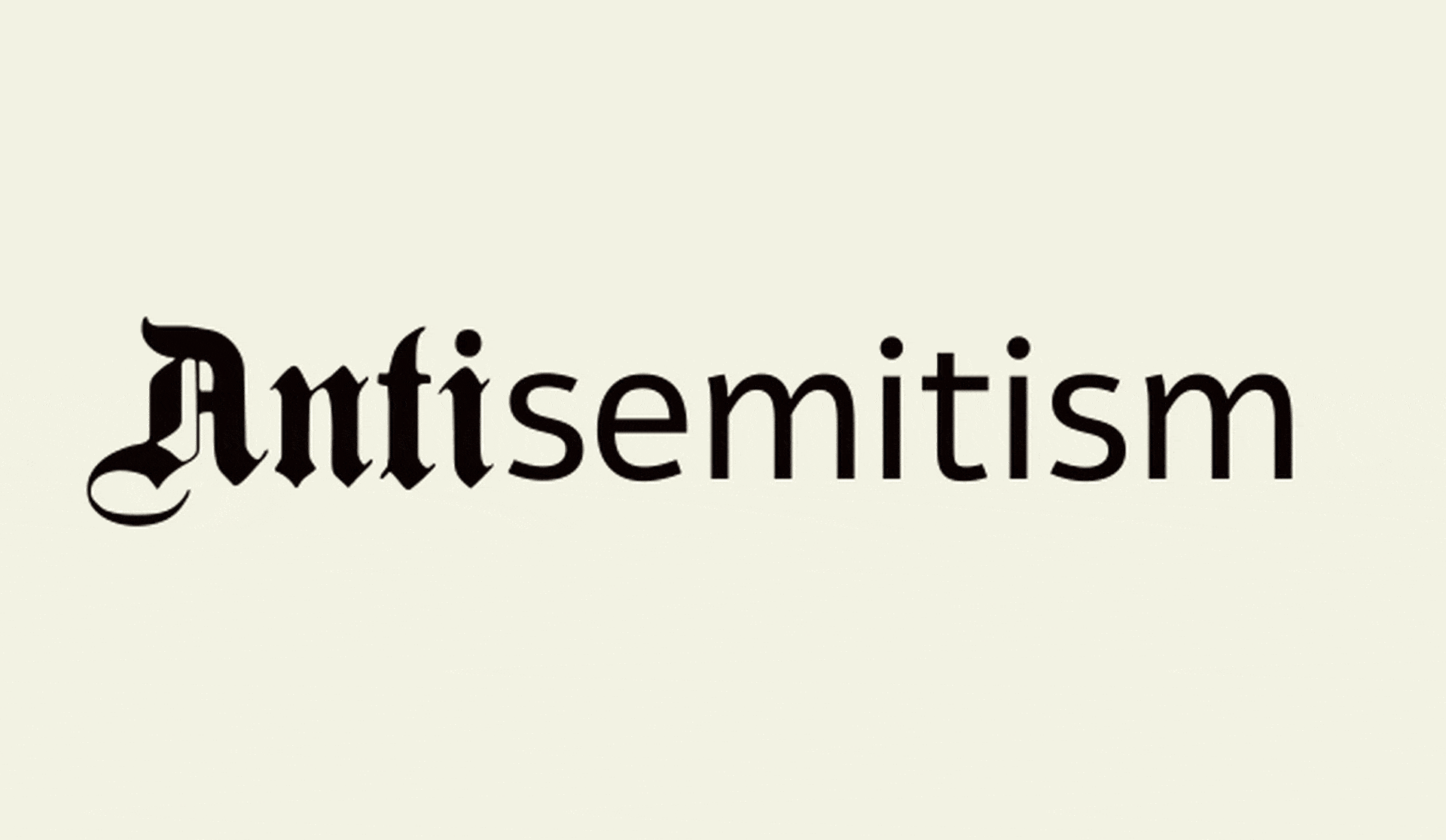Acclaimed historian Prof. Deborah Lipstadt is leading a fight to lose the hyphen from anti-Semitism, saying its presence ‘completely distorts the meaning of the word’
William Shakespeare famously asked “What’s in a name?” But when it comes to the conversation about anti-Semitism, the question is far more specific: What’s in a hyphen?
For Prof. Deborah Lipstadt, the hyphen means a great deal – and she argues that it’s time to get rid of it.
In January 2019, the acclaimed historian published the book “Antisemitism: Here and Now.” Together with explanations of its history, background, resurgence and a playbook on how to battle the phenomenon, the book included a clarion call to change the way the word is written. Lipstadt wrote emphatically that it should no longer be written “anti-Semitism.” Instead, the hyphen and uppercase S should be banished and it should be one word: antisemitism.

But even as the issue has dominated headlines in recent years – following the Pittsburgh and Poway shootings, incidents in Europe and disturbing conspiracy theories – the hyphen has proved hard to dislodge.
But Lipstadt is determined to continue her crusade, she tells Haaretz in a telephone interview.
“The hyphen is over. We are way overdue when it comes to losing the hyphen. Its presence completely distorts the meaning of the word,” she says.
Lipstadt feels strongly enough that she used her opening remarks at an April webinar on her work by the United States Holocaust Memorial Museum to state her case.
“Why do I spell antisemitism without a hyphen?” she asked. “Because anti-Semitism is not hatred of Semitism or Semites – people who speak Semitic languages. Antisemitism is Jew hatred.”
Lipstadt explains that what she is advocating is actually a return to the origins of the word. “All we are doing is going back to where it originally was,” she contends.
A race, not a people
It was in 1879 that far-right German writer Wilhelm Marr, in his pamphlet “The Way to Victory of Germanicism over Judaism” and rants against prominent Jews of the time (including Theodor Herzl and Sigmund Freud), chose not to refer to “Judenhass” – hatred of Jews. Instead, he popularized the term “Antisemitismus” – hatred of the Jewish race. He made the switch, Lipstadt says, because he preferred an “all-encompassing word: a word that would include Jews who were no longer practicing the religion, Jews who might even have converted – because he also was influenced by the idea that it was in your blood.”- Advertisment –
The word also bore a ring of pseudo-scientific legitimacy, attempting to sanitize its prejudice by eliminating any direct reference to Jews as a people; instead, they were a race.
Criticism of the hyphenated spelling in English is not new. (Like German, none of the word’s iterations in French, Spanish nor many other languages contain a hyphen.)
In 1994, noted Israeli Holocaust historian Yehuda Bauer wrote: “Anti-Semitism is altogether an absurd construction, since there is no such thing as ‘Semitism’ to which it might be opposed.”

A robust push for change came in 2015 from the International Holocaust Remembrance Alliance, a group comprised of experts from 34 member countries and created “to strengthen, advance and promote Holocaust education, research and remembrance.”- Advertisment –
The IHRA explains in its position statement that “the hyphenated spelling allows for the possibility of something called ‘Semitism,’ which not only legitimizes a form of pseudo-scientific racial classification that was thoroughly discredited by association with Nazi ideology, but also divides the term, stripping it from its meaning of opposition and hatred toward Jews.”
Referring to Jews as “Semites” and labeling Jew-hatred as “anti-Semitism,” the IHRA contends, embraces a “derived construct” providing “a category to classify humans based on racialist pseudo-science” – the kind of science that emerged in the 20th century as Nazi ideology.
Eliminating the hyphen in anti-Semitism would mean “the meaning of the generic term for modern Jew-hatred is clear,” with “no room for confusion or obfuscation,” it adds.
‘Intriguing’
In order for that to happen, Lipstadt, the IHRA and others will have to convince those who write in English-speaking media and academic publications to adopt the hyphen-less spelling, which would also demote the “S” in “Semitism” to its lowercase form. – Advertisment –
“The argument by Prof. Lipstadt is intriguing,” concedes Steven Silber, who determines Haaretz’s writing style policy. “As things stand now, the AP style guide and Webster’s dictionary – mainstays for Haaretz style – both use ‘anti-Semitism,’ as do The New York Times, The New Yorker and The New York Review of Books.”
Indeed, it is the AP Stylebook – the journalist’s bible – that keep the mainstream media, and even most Jewish publications, resistant to pressure to jettison the hyphen.
“Although the case for ‘antisemitism’ is strong, we are sticking with anti-Semitism because it appears to be the preferred spelling among most of the Jewish institutions we cover, and because it is consistent with our own newspaper’s practices going back decades,” says Andrew Silow-Carroll, editor-in-chief of The New York Jewish Week, and who previously headed the Jewish Telegraphic Agency, New Jersey Jewish News and Washington Jewish Week.
In February, Silow-Carroll penned an editorial contemplating the issue, concluding that “we at The Jewish Week have weighed the pros and cons and haven’t yet adopted ‘antisemitism,’ mostly for the sake of consistency and continuity. For some, the lowercase somehow demotes the word or concept itself, or represents a solution to a very minor and rarified problem. We’ve even heard arguments to bypass the word entirely, on the theory that a vile form of bigotry should just be called what it is: Jew hatred.”
Similarly, the Jewish Telegraphic Agency, The Times of Israel, the Forward, Jewish News Syndicate and Tablet all use “anti-Semitism.” The Jerusalem Post and The Algemeiner are in the minority having eliminated the hyphen. Asked what spurred his decision, Jerusalem Post Editor-in-Chief Yaakov Katz says that a few months after he took the job in 2016, one of his copy editors lobbied him to change the spelling.
“I looked into the matter and read what leading Holocaust historians – Deborah Lipstadt, Yehuda Bauer and Robert Wistrich – all concluded a long time ago: ‘antisemitism’ is a term that is specific to the hatred of Jews and therefore should be spelled without a hyphen and as one word,” Katz says.
Lipstadt has had more success within Jewish organizations. The Anti-Defamation League, for instance, has converted and now officially advocates for the change, declaring on its website that “while removing a hyphen by itself won’t defeat antisemitism, we believe this slight alteration will help to clarify understanding of this age-old hatred.”
The key to change
William Daroff, who became CEO of the Conference of Presidents of Major American Jewish Organizations in February, says he was convinced the “antisemitism” spelling should be used while serving in his previous job as director at the Washington office of The Jewish Federations of North America.
“As soon as I read [Lipstadt’s] book, I instituted the change at JFNA. … When I joined the Conference of Presidents, I instituted it here. Deborah’s explanation makes perfect sense to me as a way to take an imperfect word and make it a little more palatable,” Daroff says.
The American Jewish Committee, World Jewish Congress and Yad Vashem – The World Holocaust Remembrance Center have all made the switch to “antisemitism” as well, but the Simon Wiesenthal Center has retained the hyphen.
Lipstadt notes that some local Jewish federations changed their policy on the spelling of the word after hearing her speak.
But her goal of making real change rests in the hands of the media – and she hopes the Jewish media will lead the way.
She points out that the wider world “rolled their eyes and said ‘Come on!’ when black people in the United States began referring to themselves as African American.” But once it was clear they were serious, the term was widely accepted.
“I’ve been told by many people in the mainstream press who ask me about it that their decision all goes back to the AP – what the AP’s usage is. And as long as the AP sees respected Jewish media outlets using “anti-Semitism,” they won’t consider anything else. It is really time for everyone – but certainly for Jewish media platforms – to lose the hyphen.”

Anyone who has seen the 2016 film “Denial,” which chronicles the scholar’s courtroom battle against Holocaust denier David Irving, after he sued Lipstadt and her publisher for libel, knows she isn’t one to back down from a fight. And she intends to continue pressing in this battle as well.
“I haven’t hit a brick wall,” she says. “But I haven’t crossed the finish line yet, either.”




